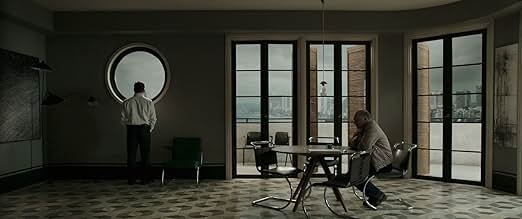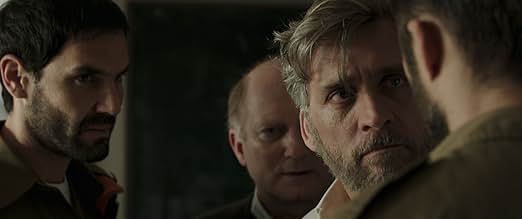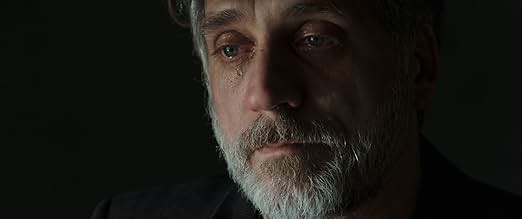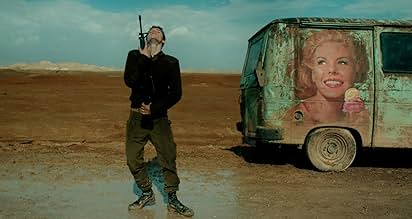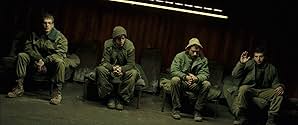IMDb RATING
7.2/10
8.3K
YOUR RATING
A troubled family must face the facts when something goes terribly wrong at their son's desolate military post.A troubled family must face the facts when something goes terribly wrong at their son's desolate military post.A troubled family must face the facts when something goes terribly wrong at their son's desolate military post.
- Awards
- 21 wins & 25 nominations total
Yonatan Shiray
- Jonathan
- (as Yonathan Shiray)
Itay Exlroad
- Dancer Soldier
- (as Etay Axelroad)
Arie Tcherner
- High Ranking Officer
- (as Aryeh Cherner)
- Director
- Writer
- All cast & crew
- Production, box office & more at IMDbPro
Featured reviews
Greetings again from the darkness. The most dreaded knock on the door. Every parent or spouse of someone who has served their country during war time fully understands that indescribable feeling of opening the door and seeing uniformed soldiers waiting to deliver the worst possible news. That knock is how Israeli writer/director Samuel Maoz (LEBANON, 2009) chooses to open his film. Knowing her son Daniel is dead sends Daphna (Sarah Adler) into hysterics, and the experienced messengers know to administer something to help her relax and sleep. Her husband Michael (Lior Ashkenazi, FOOTNOTE) stands stunned, mostly unable to respond.
What follows is one of the most stunning first Act performances we've seen on the big screen. That is not hyperbole. Mr. Ashkenazi is remarkable over the first approximately 20 minutes as a parent in shock, experiencing devastating grief. The news is debilitating to his physical and mental being. Additionally, the filmmaking during this segment is quite something to behold. The close-ups add a heavy dose of humanity, while the terrific overhead camera angle presents Michael as trapped, while also adding to the disorientation that is so key. The one-hour alarm set to remind him to "drink some water" would be humorous if not for the fact that its structure prevents the man from totally breaking down.
The second Act takes us away from Daphna's and Michael's contemporary Tel Aviv apartment and plops us into a remote military outpost where 4 young soldiers are charged with guarding a road passage. Thanks to this boring assignment, the young men find ways of adding interest to their days: timing canned goods that roll down the ever-increasing slope of their sinking-in-the-muck domicile container, raising the bar for the periodic camel that lopes by, and giving the rare passers-by a bit of a hard time as their ID's are checked. 'Of course, this is war territory, so when something goes wrong, it goes terribly and horrifically wrong.
Our final Act takes us back to the original apartment as Michael, Daphna and their daughter are working to reconcile their feelings and somehow re-assemble the pieces of their shattered lives ... though the shifts from that heartbreaking first Act are what sets the script apart from so many movies. Cinematographer Giora Bejach continues the exemplary camera work during this curious segment that leaves us feeling somewhat uncertain at first.
This family is stuck in the war that never ends. Like so many in the area, they carry burdens, guilt and grief that, like the war, also never ends. That first Act is transcendent filmmaking and acting, and the three acts work together as a prime example of the melding of visual and emotional storytelling. Most of the film takes place in one of two locales, and it's the subtleties in each shot that tell us what we must know. And yes, the foxtrot dance does play a role, but like most of this film, it's best discovered on your own.
What follows is one of the most stunning first Act performances we've seen on the big screen. That is not hyperbole. Mr. Ashkenazi is remarkable over the first approximately 20 minutes as a parent in shock, experiencing devastating grief. The news is debilitating to his physical and mental being. Additionally, the filmmaking during this segment is quite something to behold. The close-ups add a heavy dose of humanity, while the terrific overhead camera angle presents Michael as trapped, while also adding to the disorientation that is so key. The one-hour alarm set to remind him to "drink some water" would be humorous if not for the fact that its structure prevents the man from totally breaking down.
The second Act takes us away from Daphna's and Michael's contemporary Tel Aviv apartment and plops us into a remote military outpost where 4 young soldiers are charged with guarding a road passage. Thanks to this boring assignment, the young men find ways of adding interest to their days: timing canned goods that roll down the ever-increasing slope of their sinking-in-the-muck domicile container, raising the bar for the periodic camel that lopes by, and giving the rare passers-by a bit of a hard time as their ID's are checked. 'Of course, this is war territory, so when something goes wrong, it goes terribly and horrifically wrong.
Our final Act takes us back to the original apartment as Michael, Daphna and their daughter are working to reconcile their feelings and somehow re-assemble the pieces of their shattered lives ... though the shifts from that heartbreaking first Act are what sets the script apart from so many movies. Cinematographer Giora Bejach continues the exemplary camera work during this curious segment that leaves us feeling somewhat uncertain at first.
This family is stuck in the war that never ends. Like so many in the area, they carry burdens, guilt and grief that, like the war, also never ends. That first Act is transcendent filmmaking and acting, and the three acts work together as a prime example of the melding of visual and emotional storytelling. Most of the film takes place in one of two locales, and it's the subtleties in each shot that tell us what we must know. And yes, the foxtrot dance does play a role, but like most of this film, it's best discovered on your own.
The methaphorical depiction of the futile repetition of war suggested by the 'Foxtrot' title deserved a better examination than this poorly acted, tedious & ultimately unconvincing movie. Even the several Foxtrot dance scenes themselves were stilted & out of place - ditto the videos of murmations of starling flocks clumsily inserted into the cinematography. In theory the plot contained a powerful narrative of the harrowing wartime experiences of the father being repeated by his conscript son but this was lost in the overly tedious & sometimes completely pointless plot - as in the scenes involving a soft-adult magazine also handed down from father to son - which just reduced the movie's important themes to comic book farce. Things improved significantly in the third act of the movie only to be deflated again by the weak final scene (..no spoilers..) It could have been so much better.
I am not sure why, but there's just something about this movie that brings warmth to my heart. I can't say that there's something inherently unique about its message, but the way that it communicated it really resonated with me. There is no evil in this film that causes pain to characters but rather just unfortunate events. And it's not someone's fault too. I think that this is a movie about the unnecessary suffering that we all have to live through. This message is often delivered with unnecessary pretentiousness and I was happy to feel none in this film.
There were a couple of lines that felt unnecessary, but it is because the whole movie is quite subtle and communicates a lot without words so these lines felt out of place.
The cinematography is also great, although it is not something I often draw attention to. Oh, and the acting is absolutely stellar, especially one of the father, I couldn't take my eyes off his performance.
I am upset that nobody I know saw this movie but I sure will recommend it to as many people as possible from now on so it gets credit it deserves.
There were a couple of lines that felt unnecessary, but it is because the whole movie is quite subtle and communicates a lot without words so these lines felt out of place.
The cinematography is also great, although it is not something I often draw attention to. Oh, and the acting is absolutely stellar, especially one of the father, I couldn't take my eyes off his performance.
I am upset that nobody I know saw this movie but I sure will recommend it to as many people as possible from now on so it gets credit it deserves.
As others have pointed out, this is a 3-act film. Act 1 provides a chilling view of the military precision of the Israeli military's process for informing a family of a tragedy. Act 2 provides a view of Foxtrot outpost, a checkpoint guarding some deserted road. There is the general boredom, combined with occasions of high anxiety, where any car to be checked could have suicide bombers. In Act 3, the family's unsuccessful attempt to see their son's body leads to more drama, with an ending that I consider too neat - hence my low score on the movie.
I've been expecting to see faster happenings in the movie, but no, I did not. As one drama, it is good in those segments where you can follow the main character's expressions, but on the other hand it is a bit boring because he is not the only character in it and almost all the rest are unconvincing actors. From time to time a director gives us pieces of black humor and that intention drives us not to be rigorous in giving comments. It is specifically in those scenes with four soldiers in shipping container, that is slowly sinking into the muck, and in which they are located to be while guarding the border. The best two things of the movie are those shots made from above and that little cartoon where we can see the story about what happened in the past and why. From my point of view, it is worth seeing, but it is not the perfect masterpiece as we wanted to see.
Did you know
- TriviaAccording to Samuel Maoz, the film was conceived as three episodes: The first sequence should shock and shake, the second should hypnotize, and the third should be moving.
- ConnectionsReferences Qui veut la peau de Roger Rabbit (1988)
- SoundtracksNever Been
Performed by Betzefer
- How long is Foxtrot?Powered by Alexa
Details
- Release date
- Countries of origin
- Official sites
- Languages
- Also known as
- 今天跳舞不打仗
- Filming locations
- Production companies
- See more company credits at IMDbPro
Box office
- Gross US & Canada
- $618,883
- Opening weekend US & Canada
- $31,629
- Mar 4, 2018
- Gross worldwide
- $1,356,159
- Runtime
- 1h 53m(113 min)
- Color
- Sound mix
- Aspect ratio
- 2.35 : 1
Contribute to this page
Suggest an edit or add missing content



